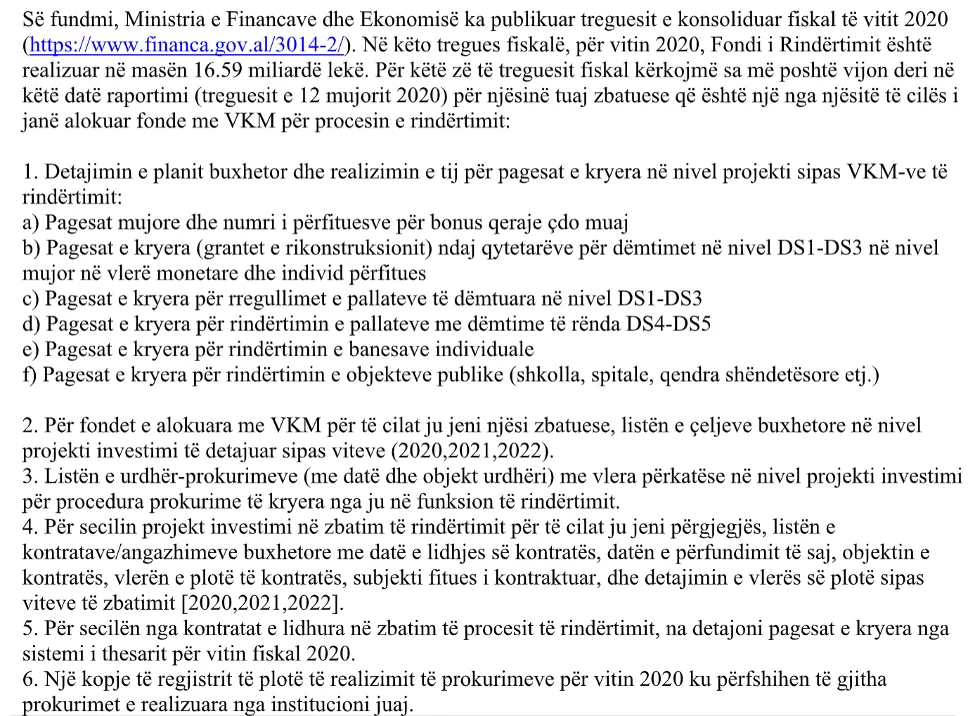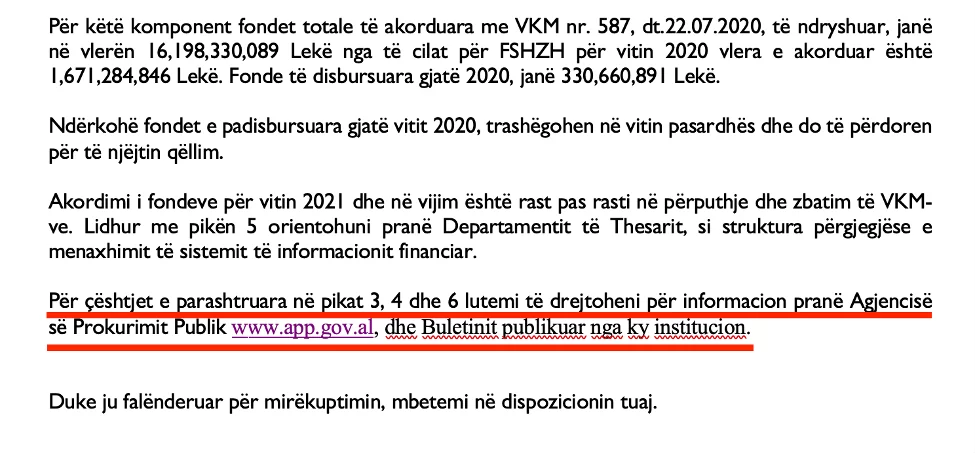JOEL ÇELA
The Albanian Development Fund, which is the implementation unit of the majority of post November 26 earthquake reconstruction projects, took the Information and Data Protection Commissioner to court. The latter had ordered the ADF to provide detailed replies as requested by “Faktoje”. According to legal experts, being taken to court is a trick used by institutions to obtain time until the information “rots” and both the journalist and the public lose interest.
During the reconstruction process verification and monitoring following the earthquake of November 26, “Faktoje” has frequently addressed requests for information to the responsible institutions.
The Albanian Development Fund (ADF) is one such institution, as well as one of the main implementation units of reconstruction projects, responsible for the majority of new constructions outside of Tirana Municipality’s territory.
On February 23, 2021, “Faktoje” submitted another request to the said agency inquiring about, inter alia, the detailed budgetary plan and its realization for executed payments, at the project level, as well as the DCM-allocated funds concerning projects for which the ADF is an implementation unit.
Request for information addressed to the ADF, February 23, 2021
On March 11, 2021, several days after the 10-day deadline had passed, the ADF provided an incomplete response. The ADF recommended us to consult the website of the Public Procurement Agency regarding sections 3, 4, and 6, although such information should have already been available to it as the implementation unit, as it is necessary for it to monitor the process.
ADF’s reply, March 11, 2021
After filing a complaint with the Information and Data Protection Commissioner about the incomplete response, and while “Faktoje” awaited a detailed response to the questions, it was notified that a hearing session with the ADF and the Commissioner would be held on April 13, 2021. After both parties had given their statements, the Commissioner sided with “Faktoje” and instructed the ADF to provide the requested information within 24 hours. No such information was provided by April 14 by the ADF.
E-mail sent to the Commissioner and the information coordinator at ADF, April 15, 2021
Two days later, the Office of the Information and Data Protection Commissioner issued Decision No. 24, whereby it once more ordered the said public authority to provide “Faktoje” with the documentation requested since February.
Decision No. 24 of Information and Data Protection Commissioner, April 16, 2021
The ADF not only failed to provide the information, but it also took the Commissioner to court on the grounds that he favored “Faktoje.” In the lawsuit, the ADF requested the revocation of Decision No. 24, dated 16.04.2021, ordering the institution to provide the requested documentation to “Faktoje”.
The court hearing comprising the ADF as the plaintiff and the Information and Data Protection Commissioner as the defendant, to which “Faktoje” has been invited as an interested party, will be held on September 23, 2021, at the First Instance Administrative Court.
Representatives of the Office of the Information and Data Protection Commissioner stated to “Faktoje” that the appeal filed with Tirana Administrative Court is a normal procedure also set forth under decisions issued by the Commissioner (paragraph 3, Decision No. 24, as shown above). According to such decision, the parties are entitled to appeal the Commissioner’s decisions within a given time, provided that such decisions are not executive as regards the Law on the Right to Information.
“In principle, in the absolute majority of cases, the court has upheld the Commissioner’s decision.” – a representative of the Office of the Information and Data Protection Commissioner stated to “Faktoje”.
Based on the experience of “Faktoje” to date regarding the enforcement of the Law on the Right to Information, it appears that the phenomenon of pressuring institutions that side with the media is a recurring one. A few months ago, it was the President’s Office that, in violation of the court decision, not only failed to provide “Faktoje” with the invoices pertaining to trips abroad of its Head, but through official letters, it also pressured the Bailiff Service, which had requested that the court decision be executed.
What is the actual threat posed by this recurring practice where a state agency refuses to provide information and even takes the Commissioner to court?
“Faktoje” contacted lawyer Irena Dule at the “Res Publica” center, who explained that taking such matters to court is an effort to cause information to “rot” until the journalist loses interest, adding that the Commissioner is a quasi-judicial body that is adequately specialized to evaluate the matter.
“Public bodies do not generally observe the right to information, particularly when the requested information is sensitive. In principle, there is no issue with taking the Commissioner’s Office to court for a decision considered unfair or infringing on a different interest; however, taking such cases to court aims to ensure activity continuation without transparency, because, while the trial is under process, the Commissioner’s Decision can’t be executed and the information can be withheld. The Information and Data Protection Commissioner is a quasi-judicial body that is adequately specialized to evaluate whether the requested information conflicts with any other rights and, if so, which is the public interest that prevails in all cases. After the Commissioner’s evaluation in this regard, as was your case, the public body cannot provide sufficient arguments to revoke the Commissioner’s decision through the court. Therefore, being taken to court is a trick to obtain time until both the journalist and the public lose interest about the information. – she stated to “Faktoje”.
Thus far, “Faktoje” has submitted at least 9 requests for information to the Albanian Development Fund concerning the reconstruction process, because the said institution is the implementation unit. According to the statement of the Minister of State for Reconstruction Mr. Arben Ahmetaj, the ADF is the implementation unit of 35 educational facility sites (under way since December 2020), 1389 individual dwelling sites, and 24 collective dwelling sites (under way since December 2020). To date, as previously reported in 2020 and 2021, the vast majority of new construction deadlines (with the ADF being the implementation unit of a large part of them, responsible for ensuring transparency and accountability) have been exceeded.
In line with its mission to promote transparency and accountability, “Faktoje” is following the reconstruction process due to its major impact on funds (approximately ALL 65 billion from the State Budget in 3 years) and on the human aspect, as hundreds of families have yet to move into their new houses, despite nearly 2 years having passed since the earthquake of November 26, 2019.









